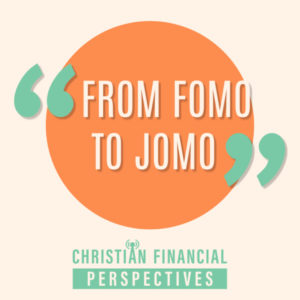Click below to listen to Episode 41 – From FOMO to JOMO
Subscribe: Apple Podcasts | Google Podcasts | Spotify | Amazon Music | Stitcher | RSS | More
From FOMO to JOMO
Bob and Mary Jo address the phenomenon regarding FOMO or “Fear Of Missing Out”. This episode shows how we can move from FOMO to JOMO “Joy of Missing Out” – joy and contentment with where you are and what you have. Wikipedia defines the “Fear of Missing Out” as:
“A pervasive apprehension that others might be having rewarding experiences from which one is absent.” This social anxiety is characterized by, “A desire to stay continually connected with what others are doing”.
As Financial Advisors, we call this mentality “Following The Herd”, which many of us are guilty of doing for fear of missing the next big thing. The same is true in other areas of our lives. Many times, investors experience FOMO, or “Fear Of Missing Out”, when they hear about a friend or family member making a big short term profit on a risky investment. Once you hear about a trade or investment that everyone is talking about, it is usually too late to profit from it, and the opportunity is lost.
In other words, FOMO can perpetuate the fear of having made the wrong decision on how to spend time.
HOSTED BY: Bob Barber, CWS® and Mary Jo Lyons, CFP®
Mentioned In This Episode
Mentioned In This Episode
Want to ask a question about your specific situation? Schedule a complimentary 15 minute phone call.
EPISODE TRANSCRIPT
[INTRODUCTION]
Bob: Welcome to Christian Financial Perspectives, a weekly podcast where we talk about ways to integrate your faith with your finances. This is Bob Barber.
Mary Jo: And I’m Mary Jo Lyons.
Bob: Are you ready to learn how to apply biblical wisdom to everyday financial decisions?
Mary Jo: Join us as we look at integrating your faith with your finances. If it’s your first time listening, welcome to our podcast, and if you’re a returning listener, welcome back.
[EPISODE]
Bob:
Exodus 20:17, “You shall not covet your neighbor’s house. You shall not covet your neighbor’s wife or his male servant, or his female servant, or his ox or his donkey or anything that belongs to your neighbor.” This is the 10th commandment of the 10 commandments.
Mary Jo:
Lately, we’ve been hearing a lot about the phenomenon regarding FOMO or the Fear Of Missing Out. I think this is just simply human nature. And as financial advisors, we call that mentality “following the herd”. How many times have you heard that?
Bob:
Many times.
Mary Jo:
We all want to follow the herd for fear of missing the next big thing or the next hot stock tip. It’s definitely something pretty consistent in our business. I want to take that back to biblical messages and kind of think about Eve in the garden of Eden. Could that have been a moment of FOMO, Fear Of Missing Out?
Bob:
Yes, absolutely it was. Oftentimes as investors, we really experienced that FOMO or Fear Of Missing Out when we hear about a friend or a family member that’s made that big short-term profit on a risky investment and then they want in, and you know what happens. That usually backfires, doesn’t it?
Mary Jo:
Sure does – greed.
Bob:
Once you hear about a trade or investment that everybody’s talking about, it’s usually too late to profit from it. So that opportunity’s lost. So just put that aside the next time you hear that hot tip on the golf course.
Mary Jo:
Yep. They always talk about the ones that win, but they never talk about the ones that don’t work out.
Bob:
I’ve noticed that.
Mary Jo:
So I think the same is true in other areas of our life, the Fear Of Missing Out, it’s actually a real thing. And we’re hearing more and more about it. Wikipedia defines it as, “A pervasive apprehension that others might be having rewarding experiences from which one is absent.” This social anxiety is characterized by a desire to stay continually connected with what others are doing.
Bob:
FOMO is also defined as fear of regret which may lead to a compulsive concern that they might miss an opportunity for social interaction, a novel experience, a profitable investment, or other satisfying events. In other words, FOMO perpetuates the fear of having made the wrong decision on how to spend your time. An example of this is how social media is causing a of us to act. Not me, thank goodness, but I can see this in others. It causes us to purchase or post something ourselves. I got away from that, Mary Jo. A couple of years ago, I was all into Facebook and I’m like, I just couldn’t handle that anymore.
Mary Jo:
It gets overwhelming.
Bob:
It does. It does. In fact, a study by Credit Karma conducted in January of this year found that 68% of millennials said they’ve made a spur of the moment purchase due to FOMO, or that Fear Of Missing Out within hours of seeing someone else post about a certain product.
Mary Jo:
You just get caught up in it. It’s so easy. I think this is really more about materialism.
Bob:
I think you’re right. Yeah, it is.
Mary Jo:
Can you relate to that? I think so.
Bob:
I can. I’m an All American boy. I can relate to it.
Mary Jo:
Back in the day we used to call it keeping up with the Joneses. How many of us know someone, or maybe we are that someone who obsess about things like big houses, luxury cars, expensive vacation, Disney cruises, Disney itself, trips to Hawaii. And we’re looking at how many families in your neighborhood, how many of the younger families, for example, with kids, are they caught up in all these expensive extracurricular activities. They’re doing dance lessons, karate, cheerleading, gymnastics, soccer, little league. Kids are going to private schools that are so expensive. There’s a tutor or a college prep school on every corner in every strip center. So obviously somebody is using them. We all have cell phones and multiple devices. And think about how many of us are buying cars, expensive cars, for our 16 year olds when they get their driver’s license. Now, we’re seeing so much about the expenses and the rising cost of college educations. Well, when did it become necessary that everybody had that college education. Trade schools are a good choice and maybe even a better choice for a lot of our kids. There’s so much about that in the news. People are even willing to break the law to get into some of those schools.
Bob:
Yeah. I’ve heard about that one. Mary Jo, when you came up with this topic, cause you’re the one that came up with this, and we started talking about this and that list you just mentioned. I gotta admit, about 15-20 years ago, I was into that hook, line, and sinker. I mean, we were doing the vacations to Hawaii. We had to have the expensive car, the big house. We were doing the dance lessons and the cheerleading and the private schools and the expensive cars for our kids at 16 or 17. And then the expensive college, private education. I had one on the East coast and one on the West coast at the same time. It’s interesting, though, as you get older and you’ve been through this and you’re going, was that really necessary? And it wasn’t, it wasn’t necessary. I’m glad to say that today, my car has got 70,000 miles on it and I’ve had it, it’d be coming on five years and I’m cool with it and I’m going to get some new brakes put in on it and I’m going to keep it. But it used to be, I had to get that new car every couple of years. I think it’s my maturity in Christ that’s helped me to learn to be content with what God’s given you.
Mary Jo:
Well, and I think safe to say, Bob, you’re not alone. And that allowing others that are in this situation to influence your life. It just may not be a healthy thing, and you’re right. We learn that as we mature. There’s nothing to be gained by comparing our own lives with others. And we’re our best selves when we’re living our own life, fulfilling our true happiness, and above all treasuring all the moments and time that we’re never going to get back instead of the stuff. I kind of want to repeat that, I think that’s pretty profound, fulfilling our true happiness above all, treasuring all the moments and time that we will never get back. I believe that FOMO is just short of envy and envy is the devil’s playground. And so Bob, the really interesting part about today’s topic is that brings us to JOMO the Joy Of Missing Out. I think I like that one so much because it’s mojo backwards and Mojo’s my nickname. So JOMO, the Joy Of Missing Out, it’s the opposite of FOMO, the Fear Of Missing Out. It’s about being present and being content with where you are and what you have. Proverbs 14:30, “A heart at peace gives life to the body, but envy rots the bones.”
Bob:
As you think about contentment, I was thinking of Paul. He’d been a high priest and then he accepted Christ and he went through so much and I love this scripture from Philippians 4:12. “I know what it is to be in need. I know what it is to have plenty, but I’ve learned the secret of being content in every and any situation, whether well fed or hungry, whether living in plenty or in want.” There’s no doubt that contentment comes truly from a strong relationship with Christ. And that’s where you get your contentment from and your self worth. There’s no doubt when you know your values and priorities, you’ll have confidence in knowing what’s right. So tune out, we want to help you to tune out all that background noise and focus on building and improving your human connections and strengthening those relationships with things that count and be intentional with your time, submitting under the guidance of the Holy Spirit and being present with God’s word, instead of the shoulds, the wants, the Fear Of Missing Out. There’s so much more joy and peace in that place with God. And we all want more joy in our lives and what to live life in less fear.
Mary Jo:
It’s not only about being intentional with your time, but also your money. There’s so much to be said for gaining and establishing joy in our lives. One of the best ways to do this is by eliminating those financial chaos that creates havoc. You don’t have to be wealthy to do this. You simply need to live within your means and save for a rainy day. Ooh, that’s scary thought, isn’t it? JOMO is about choices that energize you, whereas FOMO is about choices that deplete you. So with what you rather be, energized or depleted?
Bob:
I’d rather be energized.
Mary Jo:
I think so. And so let’s look at some specific ways to choose joy and avoid fear. I think the easiest one is to practice saying no, and that’s hard for some of us. What I already have is good enough. I don’t need more stuff to be happy. If I don’t spend this now, I can do this later. It’s my choice. Turn off all those notifications and unsubscribe. I just take a few minutes every day and I unsubscribe from all these useless emails that I get. And we don’t need all these social media notifications. They don’t help us.
Bob:
That’s the truth.
Mary Jo:
It’s a time suck. And we need to set expectations that you’ll respond in 24 hours. Not immediately, unless it’s an emergency. When did we become those people that we get this text messages, and there’s this expectation that we have our phone with us constantly. And most of all, be honest with your friends. If you’re trying to spend less, maybe they are too. I think people just don’t want to talk about it, but we’re pretty much all in that same boat, I think.
Bob:
Yeah, definitely disconnect, like you say, from all that technology and social media, and instead connect with God’s word daily where you’re going to find real joy and peace and significance and prioritize your time. And don’t waste that time on social media, like you were just talking about and worry about what everybody else is doing. Maybe even unsubscribed from Facebook. Oh no!
Mary Jo:
A lot of people are doing it.
Bob:
And all those alerts and status updates. I haven’t been on my Facebook, I don’t think, in a couple months and it hasn’t hurt me.
Mary Jo:
Yeah. I’ll go in spurts and I’ll ignore it for a week and then I’ll follow it for a couple of days. It just takes us down a rabbit hole.
Bob:
So hopefully, nobody’s just said about our podcasts, now I’m turning that thing off.
Mary Jo:
Well, hopefully it is not time wasted.
Bob:
We want to give you joy here. We’re talking about true joy.
Mary Jo:
That is absolutely true. If you’re stuck in that space, in that Fear Of Missing Out space, pay attention to what positive things those people who are financially secure are doing. Just kind of observe and watch. Want what they have because there is real joy in that. We’ve talked recently about how a paid off mortgage is the new BMW.
Bob:
That’s why Dave Ramsey always says.
Mary Jo:
A substantial emergency fund provides you with choices, and choices are freeing. Choices bring joy and not stress. I want to kind of get back to that biblical principle wondering how much is enough and who owns it all. So instead of binge watching that mindless dribble on TV or surfing YouTube for those funny pet videos that I see so much, speaking of social media, spend that time reviewing your financial future. Let’s make a plan together, a plan for a financially fit future. How does that sound
Bob:
Sounds good. And learning to recognize the opportunity costs, then you can gain more that JOMO, Joy Of Missing Out. Spend time on rewarding things like playing a game with your kids, calling a friend who’s down, or how about this one, spending time in prayer?
Mary Jo:
Oh, there you go.
Bob:
Those things that generate real returns and pay large dividends over wasting time on meaningless things. There’s so much in Ecclesiastes where Solomon talked about that meaningless, meaningless. By the way, if you read Ecclesiastes, I always say read the entire book at one time, because if you just read a chapter, it can depress you. So you need to read the whole thing where he gets to the heart of the matter in the very end and serving God and loving others. Get clear on your longterm priorities, knowing what your financial and personal goals are. It’s going to help you determine what’s the true cost of everything. What will you gain? What will you lose? And get a refresher on the value of compounding. Saving now can add such big results versus saving later.
Mary Jo:
Another good one is stay in instead of going out. In that same credit karma study that we mentioned earlier, 35% of respondents stated they saved $26 to $50 by staying in instead of going out.
Bob:
You know what, Mary Jo. I want to tell you something there, too. It’s so much healthier.
Mary Jo:
Oh, it is. Yeah. It’s real money. It can add up. What’s interesting, not to get too much off on a tangent, but since my husband retired, he’s not traveling all the time and our life is a little bit calmer. We’ve noticed we’re staying home, we’re eating more, and we’re loading the dishwasher. Now that means we have to empty the dishwasher a whole lot more often, but we noticed just how much we’re enjoying eating at home.
Bob:
Right? Exactly.
Mary Jo:
It’s cheaper and it’s better for us.
Bob:
And it’s more peaceful many times cause the restaurants can get so loud.
Mary Jo:
Absolutely. So be honest about your needs. Don’t let JOMO spending derail your savings plans. Invite your friends over for personal pizzas, popcorn, and a movie instead of spending a small fortune out on a movie. Have you priced what it costs to go to the concession stands at the theater these days? It’s like you need to take out a loan.
Bob:
I haven’t been on. So I don’t know. I got the big screen TV. So I just watch that at home. It’s a lot more comfortable and I know what I’m laying on. I’m not sure what those seats have in them.
Mary Jo:
That’s true. I think we go to maybe one movie a year, and it’s generally the one that you want to see on that really big screen. Here on Christian Financial Perspectives, you’ve heard us refer to this quote from Dave Ramsey on occasion. I think this is profound. “We buy things we don’t need with money we don’t have to impress people we don’t like.”
Bob:
Can I repeat that?
Mary Jo:
Yes, you may.
Bob:
I want them to hear it from both of us. “We buy things we don’t need with money we don’t have to impress people we don’t like.” Wow.
Mary Jo:
It leaves us in debt for years.
Bob:
Yeah, it’s a really good saying. So be aware of FOMO as well as JOMO and those spending triggers. Now remember FOMO is the Fear Of Missing Out and JOMO is the joy. You actually find joy in missing out. So do you really need that high priced, vanilla latte next time you go out or that new car when your old one can easily go a few more years? I was just saying, I ask myself that question, and does FOMO, the Fear Of Missing Out, lead to excessive screen time that leads to impulse spending. Retail therapy often leads to debt that robs you of your joy of missing out.
Mary Jo:
Do you really enjoy the time you spend with that friend that never met a designer handbag she can’t live without – I’m not naming any names or family members – versus that friend who prefers a hike in the woods versus a lunch at that trendy new spot.
Bob:
Now, you’ve got me pegged there. What am I going to like?
Mary Jo:
The walk in the woods?
Bob:
You got it. I’m a big hiker.
Mary Jo:
Yeah. As Henry David Thoreau said, “Wealth is the ability to fully experience life. Don’t let your life pass you by because you spent every minute obsessing over someone else’s.” And Bob, in this week’s sermon at church, the pastor talked about the hope that we are freed from something that enslaves us. Isn’t that the same as Fear Of Missing Out?
Bob:
I think it is, Mary Jo. It’s funny you’re talking about the handbag, I’ve got a quick story I want to tell you here. So we have our Christian Financial Advisors System that you can link all your accounts to, and it helps you with budgeting. So I have a very wealthy client makes about $800,000 a year. And he just wasn’t watching budgeting at all. So he got on this budgeting app, he started watching it and he noticed his wife had bought a purse that ran about $3,500.
Mary Jo:
Oh my goodness.
Bob:
And he’d never looked at it. He’s like, what is this? I just wanted to say it. So I don’t know if she liked the budgeting app very much. I think I was in trouble with her. I haven’t seen her since. He always comes to the reviews without her.
Mary Jo:
Yes, this is a judgment free zone. We’re not judging, but think of all the hungry mouths you could feed with $3,500,
Bob:
We’re big sponsors of Compassion International. We actually sponsor three children and we send them birthday gifts and Christmas gifts and extras on top of that. I just think about how many from that one purse, how much food could that buy? And that’s real joy. The joy of giving because it releases selfishness, as you know.
Mary Jo:
Oh yes. On that same story, I think that we found that after a lot of the natural disasters that we’ve experienced in the country over the last few years, once we got to the point where we had sufficient savings and whenever there was a crisis, we were able to just not even think about it. Instead of saying, “Honey, do you think we can afford to give?” It was, “Honey, how much should we give?” It just gave my heart joy when I was able to just immediately know I had money saved to give.
Bob:
And the conclusion of all this today, we really want to encourage you to spend time on those things that truly matter – faith, family, connecting with people, disconnect from that Fear Of Missing Out and reclaim that joy. I’d like to leave you with this scripture from today’s podcast. 1 Peter 4:9-11, “Cheerfully share your home with those who need a meal or a place to stay. God has given each of you a gift from his great variety of spiritual gifts. Use them well to serve one another. Do you have the gift of speaking, then speak as though God himself were speaking through you. Do you have the gift of helping others? Do it with all the strength and energy that God supplies, then everything you do will bring glory to God through Jesus Christ. All glory and power to him forever and ever. Amen.”
[DISCLOSURES]
Comments from today’s show are for informational purposes only and not to be considered investment advice or recommendations to buy or sell any company that may have been mentioned or discussed. The opinions expressed are solely those of the hosts, Bob Barber and Mary Jo Lyons. Bob and Mary Jo do not provide tax advice and encourage you to seek guidance from a tax professional. Investment advisory services offered through Christian Investment Advisors Inc. DBA Christian Financial Advisors, a registered investment advisor.











